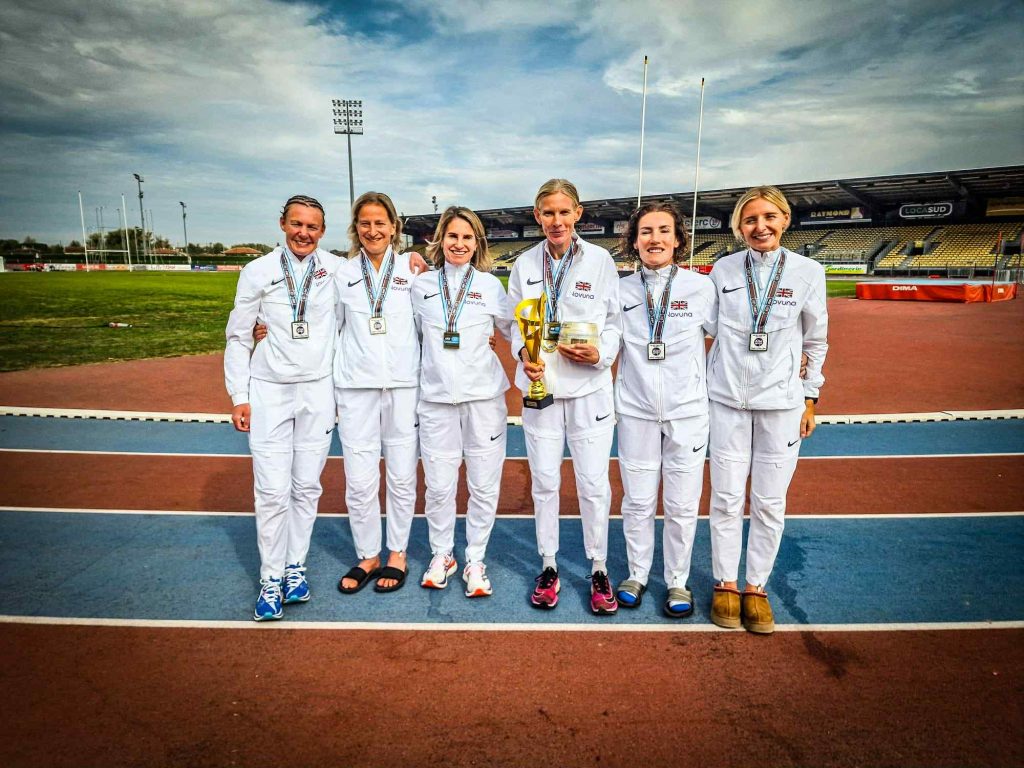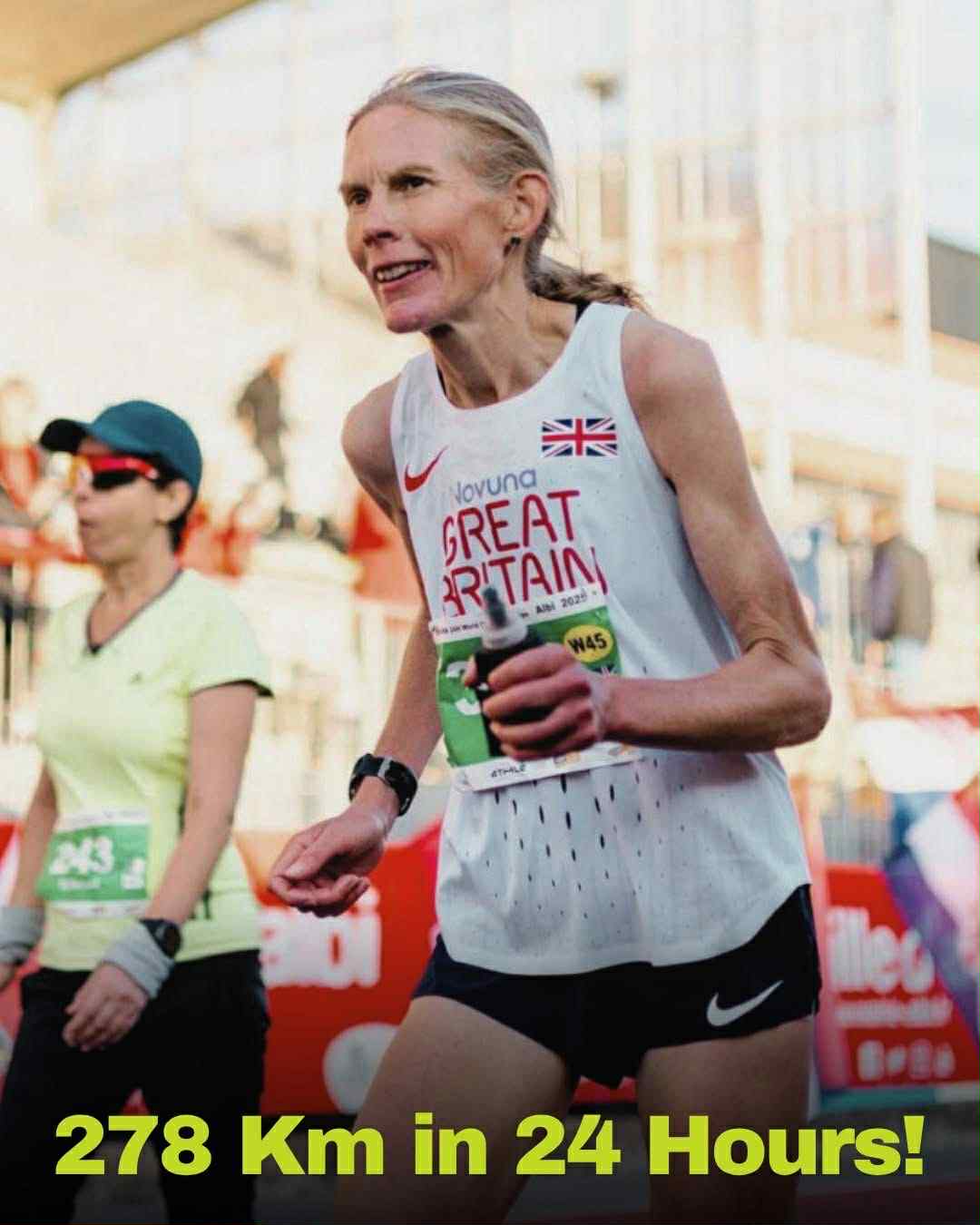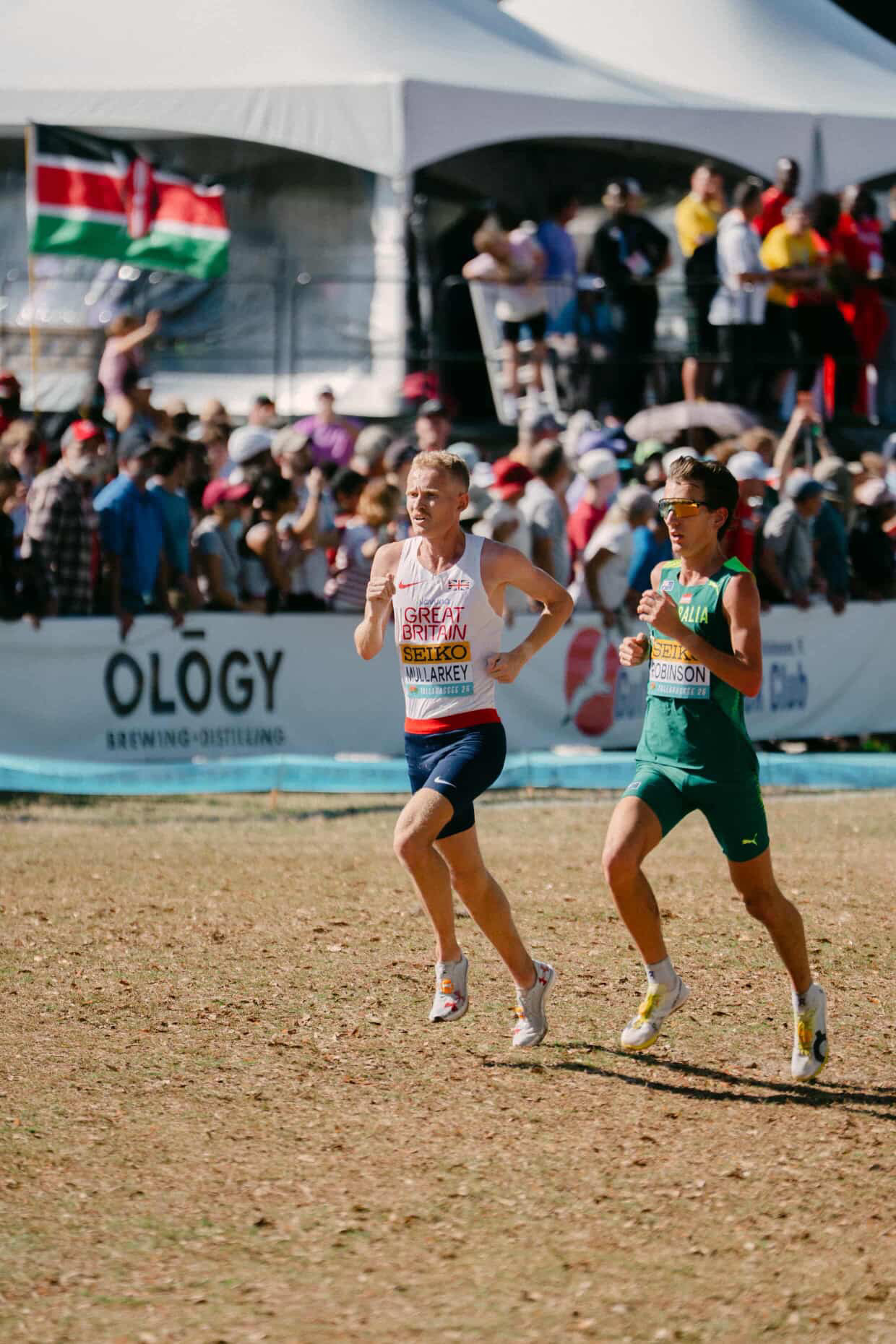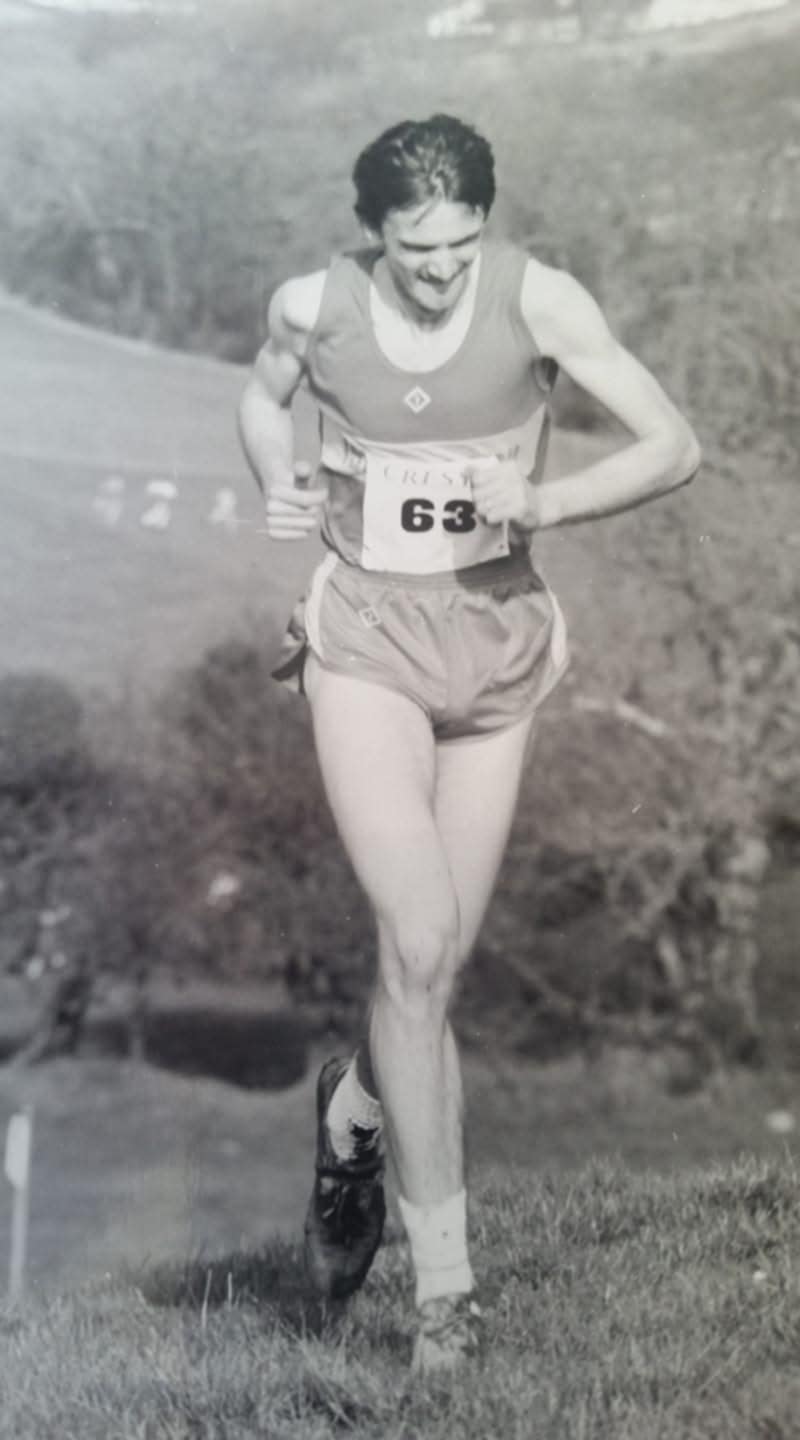Sarah Webster – Q&A
A conversation with one of the Island’s greatest endurance runners
Background & Beginnings
How did you first get into running, and what inspired your journey into long-distance running?
I started running at school when I was eight. My dad was — and still is — a runner, so it just felt natural for me to start too. I realised I enjoyed road running more than track when I returned to the sport as an adult, and the marathon quickly became my best distance.
A message then went around saying that if we had the marathon standard (2:45) for the 50km, we could earn a GB vest, as they wanted to encourage marathon runners into ultra-running. Although I didn’t get it that year, running five miles beyond a marathon didn’t worry me. Because of COVID and the Commonwealth Games, I ended up jumping straight to 100k and earning an England vest on my marathon time — which was incredible.
When did you realise you had the potential to compete at an elite level, and what early experiences helped shape that belief?
The Island Games really inspired me — it was my first taste of international competition, and being part of the Isle of Man team was incredible. Once I’d completed my first marathon, I began to think the Commonwealth Games was achievable, as the standard was only around five minutes faster.
For the ultra races, it was usually a case of looking at the selection criteria, working out whether it was achievable, and then giving it my best shot.
From your time living on the Isle of Man, how important has the island been in your development as a runner — both in terms of community support and the training environment?
The Island Games was a massive first step, and the club and athletics community were incredibly supportive and welcoming to this unknown runner who was ten-plus years older than most of the other competitors.
Steve Partington has been an amazing mentor since I stepped up to Commonwealth level and beyond, helping me in so many ways. Getting onto the IOM Sport Aid programme and doing strength and conditioning was incredible and has really helped keep me injury-free.
Having access to the gym at the High Performance Centre, the track when I needed it, the pool when I was injured, and even the sauna for heat training for India — all contributed to my performances. The same goes for psychology with Rich Sille and nutrition with Ollie Smith; their dedication was incredible.
Commonwealth Games Experience
You represented the Isle of Man at the 2022 Commonwealth Games Marathon in Birmingham — what was that experience like?
The Commonwealth Games was my slowest ever marathon, partly due to the course and conditions, but also because having COVID two weeks before had a huge impact, both physically and mentally. I wish I could go back and run another Commonwealth Games marathon, as it feels like unfinished business.
However, the overall experience was incredible — being part of the athlete’s village, the opening ceremony, seeing stars like Laura Muir on the bus, and supporting our own athletes in the stadium was something I’ll never forget.
What did competing on such a big international stage teach you about yourself as an athlete?
I learned that I needed to find mental strength to step up. Many athletes don’t perform at their best in their first major international competition because it can feel so overwhelming. The Island Games helps prepare you for that, but at this level, you need to start treating it with a professional mindset. You’re there to enjoy it — but also to perform to the absolute best of your ability, whatever is going on behind the scenes.
How did that performance influence your decision to focus more on ultra-distance running afterwards?
I’m not sure it directly changed my focus, but I was realistic enough to know I’d never reach the very top in the marathon, no matter how hard I worked. Ultra-running just suits my strengths and personality better.
Stepping Up to Ultras and International Representation
In 2023, you earned a Great Britain vest for the 50km World Championships — what did that moment mean to you?
It was such an honour. I never dreamed as a junior that I’d represent GB — we all have vague childhood dreams about going to the Olympics, but this was real, and I was doing it as a senior athlete.
The team included two marathon runners and two ultra-runners. I saw myself as the underdog — the “banker” of the team, there if anything went wrong for someone else. That took the pressure off and allowed me to run my own race.
You followed that up with a superb performance at the 2024 Anglo Celtic Plate 100k, representing England — can you tell us about that race and the European Record you set?
Unofficially, I set the record the first year I ran 100k, in 2023. That race was such fun because no one knew who I was! I was the only woman in the England team, so I could just enjoy it. No one realised I’d broken the European record until a couple of days later — too late for drug testing. So, I had to do it all again in 2024!
The 2024 race wasn’t as enjoyable — there was pressure to get the record as they’d hired drug testers just for me, which is incredibly expensive. I also had three strong England teammates close behind. But I managed it — by eight seconds!
You also went on to compete for Great Britain again over 100km later that year — can you tell us about that experience?
The 100k World Championships were back in India. It was incredibly hot, and this time I was expected to perform. I ran someone else’s race, not my own, and ended up cramping with 20 miles to go. It was a very long and painful finish! Realistically, third place was probably the best I could have done, but I’d have liked to make it a little less painful!
How did those races prepare you for the incredible performances that followed?
They taught me that I’m at my best when I run my own race, ignore everyone else, and trust my instincts.
World Record – 24-Hour Race
In 2025, you broke the women’s world record for the most distance covered in 24 hours — an incredible 278.622 km. What was going through your mind as that performance unfolded?
The first four hours felt long, slow, and hard — I remember thinking, “How can I be this tired already?” But then I found my rhythm, and the hours began to pass.
Passing the 12-hour mark, then 100 miles, 200km, and finally going into the lead all gave me a huge lift. In the final hours, I was doing maths in my head, trying not to fall over, and just keeping the pace where it needed to be. I ticked off my PB, then the British record, then the European, and finally the world record — but I couldn’t relax, as the other two women were close behind. It was my race to lose.
How did your training and preparation change leading into this event compared to previous ultras?
I did a lot more double days, which definitely helped. I dislocated my shoulder six weeks before, so I couldn’t drive — which meant I had to run everywhere, but slowly! Some days I ran up to four times. My mileage went from 100 miles per week up to around 130, though much slower. I lost some speed, but I’m sure that will come back when I focus on shorter races again.
What were the key physical and mental strategies that helped you through such a demanding race?
Physically: I planned a short break every 4–5 hours — around 30 seconds — to do assisted squats and mentally reset. As I got more tired, the breaks became more frequent, and by the last hour, it was probably every other lap!
Mentally: I started listening to music about 10 hours in, although my batteries died after five hours. Later on, the crowd support carried me through.
Was there a particular moment when you realised the record was within reach?
I knew I had to get beyond 17.5 hours — that’s when I’d been injured last time. Around that point, I took the lead, and it became my race to lose. From about four hours to go, the record was on the cards as long as I just kept going.
How did it feel when you were told to stop running, knowing you’d achieved something historic?
I couldn’t really take it in. I was so tired and dizzy — I was just relieved it was over, and that I’d done it.
Training & Preparation
Can you describe how you structure your training week — balancing long runs, recovery, and strength work?
Monday: Strength session
Tuesday: 90 mins pre-breakfast and then run home from work
Wednesday: Track session
Thursday: 90 mins and then a strength session — often running to and from the gym for extra mileage
Friday: AM: either 2 hours or a long run (3–4 hours). PM: possibly a second 1-hour run
Saturday: 90 mins pre-breakfast if working, or 90 mins AM and 45–60 mins PM
Sunday: AM: either 2 hours or a long run (3–4 hours). PM: possibly a second 1-hour run (whatever I didn’t do on Friday)
Nutrition and pacing are crucial in ultra-running — what have you learned about managing both?
Nutrition is about getting enough in — which isn’t always easy. What works in one race doesn’t always work in another. I prefer gels and drinks to solid food, though Haribo jelly snakes are great! Drinks don’t have to be sports drinks either — sparkling water, ginger ale, chocolate oat milk, and coke all help.
Pacing is critical — get it wrong, and your race is ruined. You have to listen to your body, be disciplined, and not go off too fast. That said, if I’d stuck rigidly to pace in my first marathon or 100k, I’d never have achieved the times I did. Sometimes you have to take a risk and go with how you feel.
How do you approach recovery after such demanding events?
I run again when I’m ready. For marathons and 50k, usually just 1–2 days off. For 100k, maybe 2–3 days. For 24-hour races — when I feel ready. I start back easy until I’m running 60–90 minutes again before adding speed work.
Who are the key people who support you behind the scenes — coaching, family, and crew?
My coach Dave Leach has guided me for 11 years and has been a massive support. Katie, my S&C coach, works under Dan from Collaborate Sports, and before that, Trevor Christian from the High Performance Centre helped me hugely.
My daughter crewed for me in my first 24-hour race, and she and my husband put up with my running obsession! My parents and brother are loyal supporters — my parents have even crewed for a couple of my “shorter” races.
Robbie Britton has been a fantastic mentor, introducing me to ultra-running. Jaime Pugh, a top nutritionist at Liverpool John Moores University, and his wife Sarah-Jayne crewed me at the World 24-Hour Championships — I couldn’t have done it without them.
Mindset & Motivation
Ultra-distance events can be as much mental as physical — how do you stay focused?
I focus on each lap, do the maths in my head, listen to music, and distract myself by looking at other runners and supporters.
How do you handle setbacks, injuries, or races that don’t go to plan?
I learn from them — and use them to fuel me for the next race.
What motivates you to keep pushing boundaries and setting new goals?
That’s what makes running fun — seeing just how far you can push yourself.
Do you use any mental strategies like visualisation or affirmations?
Not really, though during races I often repeat people’s names in my head — reminding myself I’m doing it for them, so I can’t give up.
Representing the Isle of Man
What does it mean to have represented the Isle of Man internationally?
It’s an incredible honour — I’m very proud to have been part of the Isle of Man team.
How would you describe the support from the Manx running community?
Amazing — from the clubs, athletics community, and IOM Sport. The financial help, time, and constant encouragement have been invaluable.
What advice would you give to Manx runners who dream of following in your footsteps?
You’re never too old to start running, and you can push yourself far harder than you think. Build up gradually and be consistent. It’s better to run 45–60 minutes, 4–5 times a week, plus a longer weekend run, than cram everything in at once. Be creative with your time — even 30 minutes can make a difference.
Future Goals & Legacy
After achieving a world record, what’s next?
I’m not sure yet — I’m waiting to hear about upcoming championships and might try some trail races (as long as they don’t involve too much navigation, technical downhills, or mud!).
Do you see yourself continuing to compete at the highest level?
I’d love to continue for a few more years before I get too old — but there are some incredible women coming through!
What do you hope your journey shows to the next generation of Manx athletes, particularly women?
I hope they’re inspired. We’re already seeing fantastic progress in women’s distance running on the Isle of Man. I’ve never been particularly talented — I wasn’t an English Schools runner, I was around 300th in junior cross country, and even my 10k and marathon times weren’t outstanding. But I’ve built up mileage and worked consistently for 10 years. It shows that anyone can get there if they believe in themselves and are willing to work hard.
How would you like to be remembered in the world of ultra-running?
The ultra-running community is lovely — small, welcoming, and familiar. I hope I’ve inspired some of the women in it to start chasing the men’s times and continue raising performance levels.
Quick-Fire Questions
Favourite race distance? Probably 100k — but 50k races are fun too, as they’re shorter but not as intense as marathons.
Hardest training session? A four-hour training run on the track.
Most memorable race so far? The 24-Hour World Championships.
Go-to pre-race meal? Pasta.
Favourite place to train? South Downs Way.
One word to describe how it feels to be a WORLD RECORD HOLDER!? Surreal!




